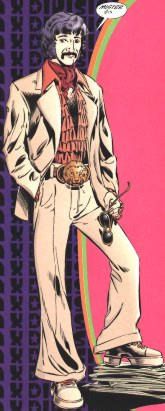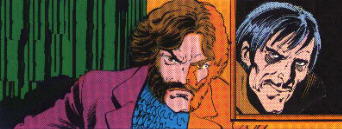
 Thanks to a discussion on Barbelith I found on LinkMachineGo, I discovered that two comics characters, Mr. Six in The Invisibles and Jason Wyngrade of the Hellfire Club (Chris Claremont and John Byrne’s revised take on Mastermind, from the X-Men storyline that lead into the Dark Pheonix story), are actually based on actor Peter Wyngrade, who played a supervillain running a Hellfire Club in an episode of The Avengers TV series (“A Touch of Brimstone“); In that episode he turned Emma Peel into a “Queen of Sin”, with a fetish outfit (spikey collar, corset, boots) very similar to Jean Grey’s “Black Queen” identity.
Thanks to a discussion on Barbelith I found on LinkMachineGo, I discovered that two comics characters, Mr. Six in The Invisibles and Jason Wyngrade of the Hellfire Club (Chris Claremont and John Byrne’s revised take on Mastermind, from the X-Men storyline that lead into the Dark Pheonix story), are actually based on actor Peter Wyngrade, who played a supervillain running a Hellfire Club in an episode of The Avengers TV series (“A Touch of Brimstone“); In that episode he turned Emma Peel into a “Queen of Sin”, with a fetish outfit (spikey collar, corset, boots) very similar to Jean Grey’s “Black Queen” identity.
However, Jason Wyngrade’s look, with the mustache and sideburns, as well as his first name, came from the character Jason King which Wyngrade played in a TV series called Department S and a later series of spin-offs. Grant Morrison’s Mister Six in The Invisibles is more simply derived directly from Jason King. Austin Powers probably owes a greater debt to Jason King than to most other sources.


 Thanks to a discussion on
Thanks to a discussion on 